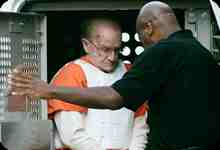Klansman's Murder Trial Begins
/
Eight whites, four blacks comprise jury
The kidnapping and conspiracy trial of the reputed Klansman James Ford Seale has proceeded with prosecutors vowing to pin him down with charges.
Prosecutors promised jurors during opening arguments on Monday that they will prove the reputed Klansman were among those who abducted, beat and drowned two black teenagers in 1964.
Seale, now 71, has pleaded not guilty to federal kidnapping and conspiracy charges in the attacks on Dee and Moore, both 19. He has also denied being involved in the Klan.
"Being a member of the Klan was not a crime then and is not a crime now," public defender George Lucas told the jury of eight whites and four blacks.
About 60 spectators, including family members of Seale and the victims, watched the opening arguments. Among the three whites chosen as alternate jurors, there is one woman whose father had been a member of the KKK.
Seale and reputed Klansman Charles Marcus Edwards were arrested in 1964. The Dee-Moore case was turned over to local authorities, instead of FBI, who threw out all charges against Seale and Edwards. Seale was indicted and arrested again in January 2007.
Edwards, Seale's cousin, has been given immunity and is expected to provide key testimony for the prosecution.
The charges of kidnapping and conspiracy against Seale hinge on the prosecution proving the victims were taken across the state line into Louisiana before being tossed into the Mississippi River to die, Lucas said.
Prosecutors say another witness they want to call is the former daughter-in-law of Seale who will testify with evidence that he was a Klan member. [MORE]
- Pictured above: Reputed Ku Klux Klansman James Ford Seale, wearing a bullet resistant vest
Defense attorneys told US District Judge Henry T. Wingate that they want to limit the testimony of the former daughter-in-law. Wingate said he would rule on that request later.
The Justice Department reopened an investigation in 2000. The FBI closed the case again in 2003 but reopened it in 2005. The trial is expected to last about two weeks.






























































































































































































































































































